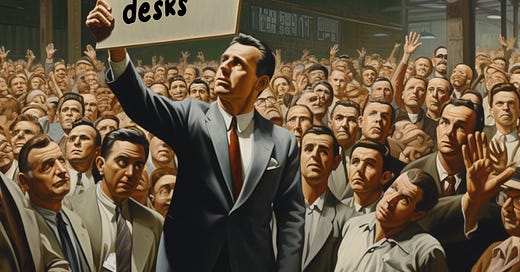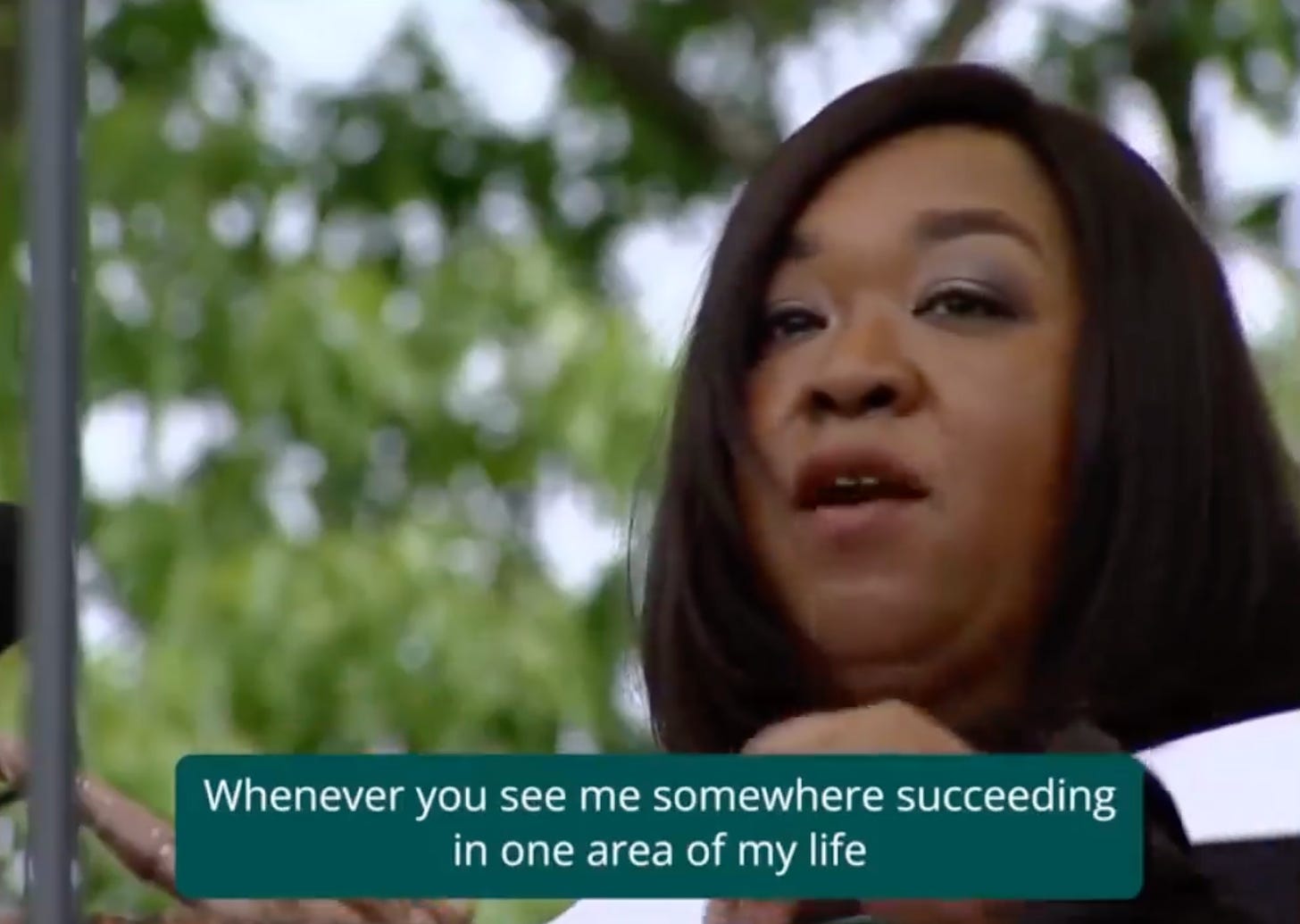While some bosses are making anxious decisions it’s far from a trend
You might have seen the headlines that Nike is summoning workers back to the office 4 days a week.
Be careful seeing the headlines and concluding that the full return to the office (RTO) is becoming increasingly inevitable.
Yes, Nike's ask for employees to return to the office four days a week is likely to signal a RTO office push for big destination brands - and for bosses who hated flexible working from the off. Destination employers, like Nike or big tech firms, seem intent on using their brand capital to move the dial towards their traditional working practices. This approach is certainly the preferred solution for veteran bosses, last week a survey from KPMG suggested that 2/3 of bosses believed we'd end up with a 5-day office week. 83% say they’re likely to reward employees who make an effort to come into the office with pay raises or promotions.
It’s worth remembering that pre-Pandemic that these were the people who bemoaned headphones ruining the buzz of the office. They have an idealised version of work in their heads that has never existed.
TikTok, Snapchat have already done the 4-day thing, and elsewhere I've heard of bosses testing out 'monthly office Fridays'. ("We’ve made it fun, we’ve got everyone bacon sandwiches!" someone who seems oblivious to the cost of transport tried to convince me this week).
But in the wider job market WFH is remaining strong - and immensely popular.
Across the job market we're averaging 30-35% of the week at home and that stat doesn't seem to be changing. According to Gallup 90% of the workforce doesn’t want to go back to the way things were before. Workers are more likely to say they’d take a paycut for more flexibility in their job than want to go in for a bacon sandwich.
More than anything working from home remains immensely popular for working parents, those with pets and for people with arduous commutes. It’s also been hugely popular with those whose jobs involve deep work and concentration.
I always remember the commencement speech from iconic TV showrunner Shonda Rhimes: 'Whenever you see me somewhere succeeding in one area of my life, that almost certainly means I am failing in another area of my life’.
Pre-pandemic many working parents experienced a version of life with echoes of Rhimes' speech. They felt judged for shirking when they were leaving early, or knew they were letting their family down when they stayed late.
WFH allowed them to feel like they weren't failing in areas of their life.
Now 83% of bosses are telling these workers that their fears were right, that they’ll choose to promote the workers they can see late in the office.
While we might see brands like Nike, TikTok and Snapchat bringing workers back to the office, we shouldn't lose sight of the fact that those decisions will make the world of work less diverse and less inclusive. This week women in Iceland walked out on a General Strike because of the country’s 20% gender pay gap. At 15.5% the gap isn’t much less in the UK.
It is widely accepted that differences and men and women’s pay stem from mid-career pauses for maternity and for the fact that job flexibility has typically been traded off for salary and career development.
In a couple of years when the likes of Nike find themselves cursing a reduction in female leaders they shouldn't lose sight of the fact that they've got the version of work that they signed up for.
(Like an idiot I accidentally reset the vote on Wednesday night)
Two weeks ago I did a podcast on the 'Big Ange effect' at Tottenham Hotspur. I think this Paddy Power video sums it up better than a 30 minute podcast ever could: "People are basically happier when the manager isn't a bellend". Universally applicable
Keep the good news coming: renting rather than owning your home is linked to your body aging faster
A second order effect of Covid, nights are getting earlier: I went to a gig at Camden Roundhouse a few weeks ago. I was surprised when it finished at 9.50pm. But in many ways it seemed to reflect a trend that has been happening since Covid - that since the advent of hybrid working we’re living life earlier. Now the National Theatre has said they’re going to experiment with earlier start times of 6.30pm
Would you be comfortable declaring your friendships at work? There's often cycles of power in companies. In recessions it's often the finance chiefs running things to get the numbers back on track. At ITV right now it's the lawyers calling the shots: ‘ITV bosses tell staff to declare their friendships or face the sack’. After the Phillip Schofield scandal the firm has told employees they need to declare all relationships, describing a relationship as 'a friendship, sexual or romantic connection, or a family relative'. In terms of the impact on work romantic/sexual relationships seem to be different to friendships - and they themselves tend only to be problematic when a power difference in place. Tech firm Oracle once went to an extreme version of this, not only forbidding relationships but also telling employees not to become friends on social media together. The lawyers had decided that employees becoming too close created a legal exposure. In the case of ITV the policy seems to bear more relation to the desire to keep scandal out of the Daily Mail than a reasonable part of working life. Time for the lawyers to take a step back. (We discuss this in the podcast below)
The boss of Blackstone, the huge asset management firm, has declared that remote workers ‘don’t grind as hard’ as office based workers. As a result his firm is ‘by and large, operating the same way now as it did before the pandemic’. Blackstone is one of the largest owners of commercial property in the US
There are 1.5 million mystery shoppers in the US performing a job often styled as ‘corporate espionage’. A bad report from a mystery shopper can cost a retail worker their job in an industry that ‘pits underpaid shoppers against equally poor employees’ - grim reading about a job that we never think about
A really fantastic HBR piece where Frances Frei and Anne Morris give an outline for effective storytelling by leaders (‘In our experience, leaders generally need to double or triple their pace of strategic messaging’.) I love this because it gives a clear template to give things a go
Slack paused their business for their team to catch-up on training for a week
In Iceland there was a general strike of women this week (including the Prime Minister) as a protest against the lingering 21% wage gap between men and women in the country. The UK’s gender pay gap is 15.5%
I’m joined by Ellen Scott and Matthew Cook as we discuss the challenge of disclosing workplace friendships, how increasing numbers of workers are getting PTSD from their jobs.








Besides companies tied to property investments, I think there's a push from the government as well.
Here in Ireland, I can only imagine the amount of tax/transport revenue they lost (and are still losing) when people start working from home 3+ days a week.
So many restaurants survived on corporate workers getting their morning coffee and sausage roll on their way to work every single day.
But I still question the validity of moving millions of people across the city so they can sit at a desk to do the same job they could be doing from their homes... I guess someone has to pay for the infrastructure cost...